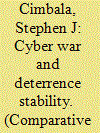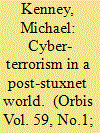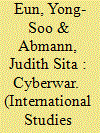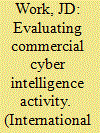| Srl | Item |
| 1 |
ID:
133995


|
|
|
|
|
| Publication |
2014.
|
| Summary/Abstract |
Nuclear deterrence and cyber war are often discussed as separate worlds of research and military-strategic practice. To the contrary, a certain degree of overlap between nuclear deterrence and cyber conflicts is a plausible expectation for several reasons. First, future deterrent challenges will include regional nuclear arms races accompanied by competition in information technology and other aspects of advanced conventional command-control and precision strike systems. Second, cyber-attacks may be used against opposed nuclear command-control systems and weapons platforms as well as against infrastructure for the purpose of mass disruption during a crisis or war. Third, cyber capabilities support escalation dominance or escalation control, depending on the objectives of states and on the transparency of identification for cyber friends and foes.
|
|
|
|
|
|
|
|
|
|
|
|
|
|
|
|
| 2 |
ID:
017638


|
|
|
|
|
| Publication |
2000.
|
| Description |
p89-104
|
|
|
|
|
|
|
|
|
|
|
|
|
|
|
|
| 3 |
ID:
148070


|
|
|
|
|
| Summary/Abstract |
Recent cyber-attacks such as Stuxnet and Anonymous’ increasingly aggressive digital activism have rekindled fears that cyber-terrorism is an imminent threat. However, the concept remains poorly understood. Confusion over cyber-terrorism stems, in part, from recent attempts to stretch the concept to include hacktivism and terrorists’ use of the Internet to facilitate conventional terrorism. Although the United States and other countries have experienced thousands of cyberattacks in recent years, none have risen to the level of cyber-terrorism. This article seeks to dial down the rhetoric on cyber-terrorism by explaining how it differs from cyber-attacks, cyber-warfare, hacktivism, and terrorists’ use of the Internet. The most immediate online threat from non-state terrorists lies in their ability to exploit the Internet to raise funds, research targets, and recruit supporters rather than engage in cyber-terrorism. Cyber-terrorism may well occur in the future, but for now online crime, hacktivism, and cyber-warfare are more pressing virtual dangers.
|
|
|
|
|
|
|
|
|
|
|
|
|
|
|
|
| 4 |
ID:
147381


|
|
|
|
|
| Summary/Abstract |
This article examines the implications of cyberwar for national security and traditional warfare. While not making traditional war obsolete, cyber-weapons can nonetheless be force-amplifiers for kinetic attacks in future wars. Not only are cyber-weapons easier to deploy, they can also be activated much more cheaply than conventional weapons. This cost–benefit ratio levels the playing field, especially to the benefit of Third World countries which lack considerable leverage in terms of exercising traditional military power. By bringing new aspects to the theater of war, cyberwar asks us to revamp our policy and study of security, war, and power. Although it does not change the very nature of warfare which remains political, instrumental, and violent, cyberwarfare will reshape the ways in which war begins or is carried out in the near future. Our analytical and theoretical understanding of the international politics of the digital age can be enriched by taking what is happening in cyberspace more seriously.
|
|
|
|
|
|
|
|
|
|
|
|
|
|
|
|
| 5 |
ID:
171058


|
|
|
| 6 |
ID:
174608


|
|
|
|
|
| Summary/Abstract |
Nowadays hybrid warfare is considered a significant security challenge; within this wider threat category are cyber incidents that are considered one of the main perceived threats in modern society for every country. The number of incidents in cyber space is constantly growing, but methods of its realisation are evolving. One of the most dangerous consequences of cyber-attacks is a planned or spontaneous chain effect that is accompanied by destructive results. Ukraine is used as a contemporary example of this type of attack and subversion. This is later put into context with trends and events on a wider international level that imply legal regulation conflicts with political and operational expediency in managing the problem of cyber-attacks.
|
|
|
|
|
|
|
|
|
|
|
|
|
|
|
|